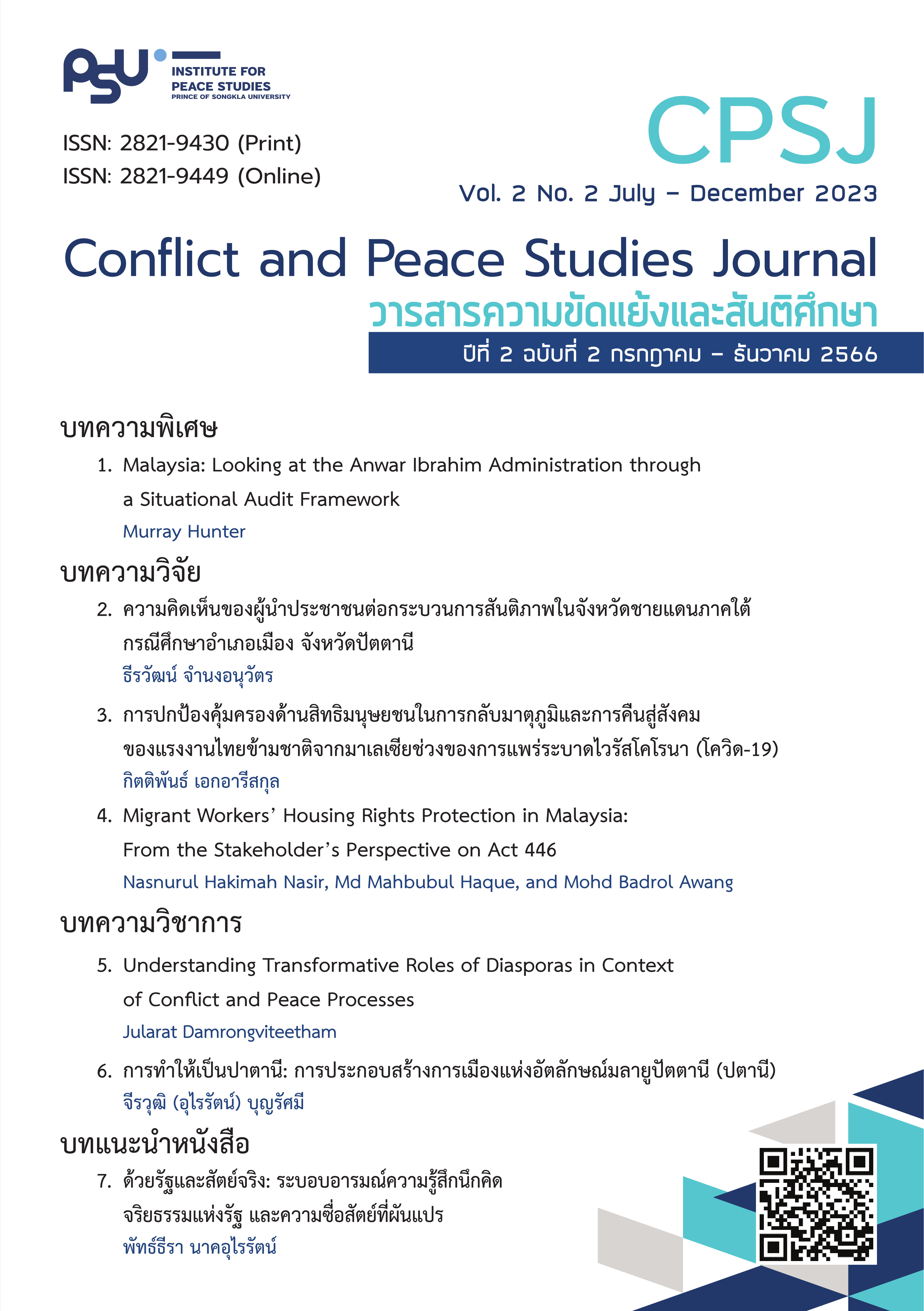Perspectives of Local Leaders on Conflict Resolution and Peace Process in Three Southernmost Provinces in the Muang District, Pattani Province
Main Article Content
Abstract
The violence in the three southernmost provinces of Thailand has occurred for more than 19 years. This problem is creating insecurity and affecting property and the quality of life. Trying to restore peace to the three southernmost provinces is therefore an important policy. This study used qualitative research methods. The purpose of this study is to examine the current perspectives on conflict resolution and factors affecting the peace process in the three southernmost provinces, including recommendations from the middle leadership group (Track 2). The key informants were 12 middle leaders of society (Track 2), including 4 community leaders, 4 local leaders (Tambon Administrative Organizations), and 4 religious leaders who live in the Pattani province. The tool used in this research was an in-depth interview. Data collection was done using in-depth interviews and documentary research.
The findings showed that the violence was a result of a power struggle in the area, distorted history, religious beliefs, and drug trafficking. The people in the area want peace,, which accords with the principles of Islam. There is optimism that the current violent situation will improve. Moreover, the people support a compromise in the process of government, but some people are still concerned about the peace process. This study also suggests that the leaders of the provincial Islamic committee participate in the negotiation process and give offenders a chance to return to their normal lives. They also recommend using the King’s philosophy for solving conflict and they want to have a special administrative region. The middle leaders hope this solution will be able to improve the peace process in the three southernmost provinces.
Article Details
References
Anuwataudom, M. (2012). Aceh Peace Process Republic of Indonesia (1st Ed.). Thammadapress.
Baka, D., Laehheem, K., & Abru, A. (2006). The Attitudes of the People Toward Unpeace in the Three Southern Border Provinces of Thailand. Prince of Songkla University, Pattani Campus.
Boonpunth, K. C. (2019). Public Participation in Building Sustainable Peace in Southern Thailand. King Prajadhipok's Institute journal, 17(1), 100-117.
Chaijaroenwatana, B. (2008). A Study of Policy and Measures Towards Unrest Situations and Development in the Three Southern Provinces in Thailand. Prince of Songkla University.
Chaijaroenwatana, B. (2020). Conflict Management: Basic Understanding & Case Studies (2nd ed.). Prince of Songkla University.
Conflict Incident Database. (2023). Deep South Watch. Retrieved April 3, from https://deepsouthwatch.org/th
Helbardt, S. (2010). Anatomy of Southern Thailand’s Insurgency: Some Preliminary Insights. Retrieved from http://www.newmandala.org/wpcontent/uploads/2010/01/Anatomy-of-Southern-Thailand%D1%82%D0%90%D0%A9s-Insurgency.pdf
Jitpiromsri S. (2023). Election 2023 : It’s Time to Return Politics to the Southernmost Provinces Peace Policy with Mr.Srisompob Jitpiromsri. Retrieved May 5, 2023, from https://www.the101.world/srisompop-interviewelection2023-and-deepsouth/?bookmark=339816
Jansomboon, K. (2013). Violence in the Southernmost Provinces : Hero or Traitor. Navikathipatsarn, 14(85), 34-46.
Khamphothong, R. (2018). Peace process in Mindanao, the Philippines from 1972 to 1976. Journal of Politics and Governance, 8(1), 267-286.
Panjor, F. (2022). Does the Constitution Guarantee the Peace Process in Mindanao and Thailand's Deep South Conflict?. King Prajadhipok's Institute journal, 20(2), 121-140.
PEACE SURVEY 1st. (2016). Survey of Public Opinion on the Peace Process in Three Southernmost Provinces No.1st (Research Report). Prince of Songkla University.
PEACE SURVEY 2nd. (2016) Results of a Survey of Public Opinion on the Peace Process in Three Southernmost Provinces No.2nd (Research Report). Prince of Songkla University.
PEACE SURVEY 3rd. (2017) Results of a Survey of Public Opinion on the Peace Process in Three Southernmost Provinces No.3rd (Research Report). Prince of Songkla University.
PEACE SURVEY 4th. (2019) Results of a Survey of Public Opinion on the Peace Process in Three Southernmost Provinces No.4th (Research Report). Prince of Songkla University.
PEACE SURVEY 5th. (2020). Listen to the Voices of the People Reviving the Peace Process PEACE SURVEY Announcement of the Results of the Public Opinion Survey on the Peace Process in Three Southernmost Provinces No.5th (Research Report). Prince of Songkla University.
PEACE SURVEY 6th. (2021) Results of a Survey of Public Opinion on the Peace Process in Three Southernmost Provinces No.6th (Research Report). Prince of Songkla University.
Pindavanija, E. (2018). Conflict Theory and Violence Conflict Prevention, In P. Wasi (Ed), Basic concepts of conflict management through peaceful means (p. 8-11). King Prajadhipok's Institute journal.
Sahoa I. (2014). The Importance of Track 2 in Peace Process in Three Southernmost Provinces. Retrieved October 17, 2014, from https://prachatai.com/journal/2014/10/56055
Tamthai, M. (2018). Weaving Patani's Dream Non-violently: An Analysis of Conversations for a New Imagination. Thailand Science Research and Innovation.
Tapuling, P. C. (2013). The Buddhist Approach to the Management of Family Violence. (Master of Arts). Chiang Mai University.
Varadhammo, P. (2017). The Peace on the Triple Junction. Journal of Graduate MCU Khonkaen Campus, 6(2), 59-61.
Wongshookaew, B. (2017). Insight Dialogue Meditation: The Integration for Resolving Conflict of Relation. Journal of Educational Innovation and Research, 1(1), 114-132.

